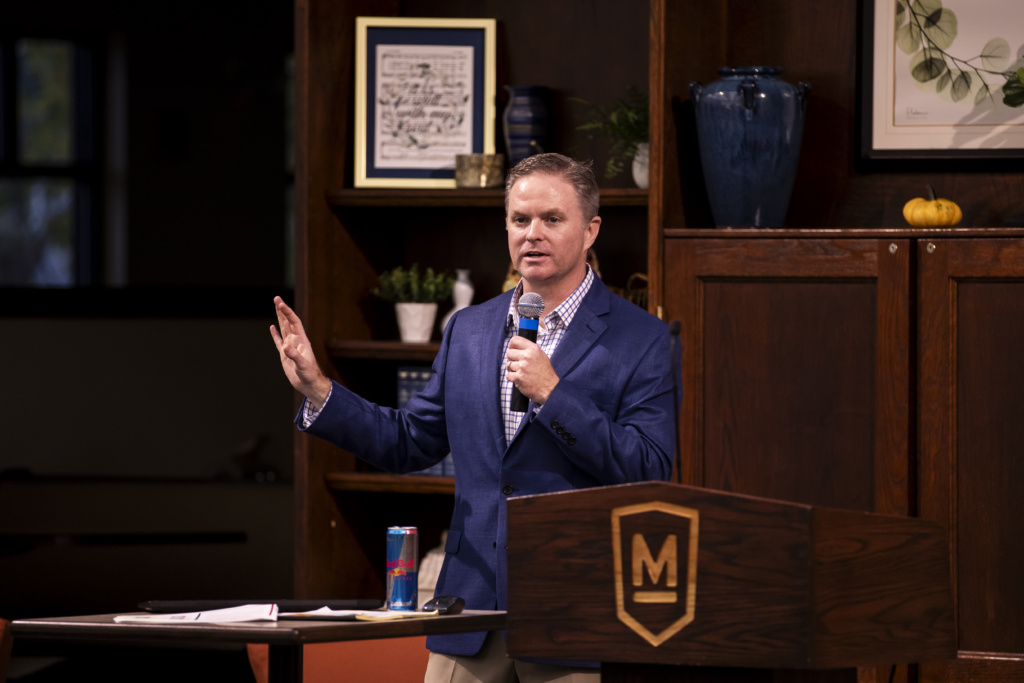Leadership Breakfast 10.24.23 | Personal Finance and the American Economy
Community members, faculty, staff, and students gathered at Maranatha’s leadership breakfast on October 24th. Tom Parks, Director of Retirement Plan Services at Annex Wealth Management, shared data demonstrating the United States’ current economic condition and gave the audience some tips on how to become financially secure.
Parks explained to the audience that the event was a “NO JUDGMENT ZONE,” and he acknowledged that the path to secure finances is simple but not easy. Parks began by outlining current economic problems. He explained that 71% of people experience stress in their personal and work lives. One of the biggest contributing factors to this stress is finances.
In the United States around 42% of individuals earning $50,000 a year live paycheck to paycheck. Of those who earn $50,000 to $100,000 a year, 46% live paycheck to paycheck. And of those making over $100,000 a year, 16% are living paycheck to paycheck, and 34% are barely getting by. Parks warned that financial instability can wear people down over time.
He told the audience that credit card debt has skyrocketed in recent years. He cited the New York Fed’s total debt balance of the United States which demonstrates the highest debt categories in order: student loans, auto loans, credit cards, and “other”. He challenged the audience to consider how these categories contribute to financial stress.
Ultimately, Parks explained that Americans need to give up the idea of “having it all,” especially when it includes heavy reliance on credit. He argued that to become financially free, you must make choices. He informed the audience about the possibilities of compound interest and encouraged everyone to open a savings account. Saving money early, he explained, gives it time to accumulate interest, and time makes all the difference.
When Parks began working for Annex Wealth Management, he knew nothing about finance. He encouraged the audience, “This stuff is not rocket science.” According to him, anyone can learn how to take care of their finances properly. Parks pointed out, however, that unfortunately, Americans don’t save as much as people in other developed nations. Even though they can save money, he explained, one in ten Americans don’t have a savings account.
Parks then discussed how student loans contribute to the debt crisis. He pointed out that many claim “education is the best investment,” but he indirectly asked the question, “Is it?” He stated that for an investment to be good, there must be an ROI (Return on Investment). According to Parks, today, the cost of education is significantly higher than it was in previous decades. He explained that this high cost has made the average student loan payment $503 a month. Parks challenged the audience to make sure an investment in education is worth it.
He then shifted to how the government has contributed to this problem. According to graphs and statistics cited during Parks’s presentation, the current debt of the United States has reached well into the trillions and is climbing every day. An unprecedented hiking cycle shows that interest rates are rising over time to compensate for the debt. These high rates contribute to the financial issues mentioned above.
Furthermore, Parks explained that the rise of Marxism in higher education could also be a contributing factor. He argued that the belief and practice that the government should pay for everything ultimately leads a nation into insurmountable debt. He also pointed to studies showing that Christianity is declining. According to the studies, every day more people become undecided or agnostic about their religious convictions. Parks declared, “Poverty is not an economic problem, it’s a moral problem.” He stated that when a nation walks away from God, its stability begins to crumble. He ended the breakfast by challenging the audience, “You are in control, but you must make good decisions…. Have hope and believe that if you do what you’re supposed to do this stuff will work out.”
A Q&A was held after the breakfast.
Learn more about Leadership Breakfasts here.


